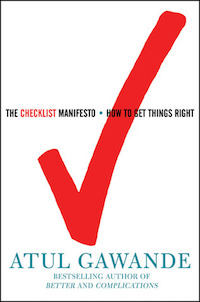The Checklist Manifesto by Atul Gawande
It somehow feels beneath us to use a checklist, an embarrassment. It runs counter to deeply held beliefs about how the truly great among us—those we aspire to be—handle situations of high stakes and complexity. The truly great are daring. They improvise. They do not have protocols and checklists.
Gawande does an excellent job of arguing the opposite. While checklists cannot be living, breathing heroes, they can be the means by which any person (or team of people) attains the status. As he says,
…maybe our idea of heroism needs updating.
Checklists “are not comprehensive how-to guides…. They are quick and simple tools aimed to buttress the skills of expert professionals.”
I appreciate Gawande’s perspective and the ease with which he communicates the benefits of checklists. He succinctly explains how checklists enhance the process by which intelligent people apply their knowledge and experience. They do not replace the people themselves or their intellectual capacity to make decisions. The checklists operate as a reminder to complete a small set of select important items or communications.
Gawande provides examples of how simple checklists have improved the processes (as measured through quantifiable results) in several different fields, from medical to construction to financial investment. Reading through the examples gave me several ideas for how to incorporate checklists into my own work.
Remember, checklists don’t replace knowledge or experience.
